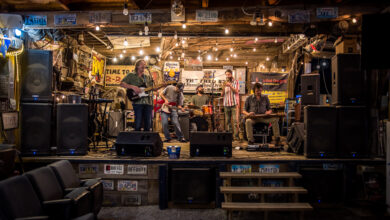Mississippi Blues Trail Series – Bentonia Blues
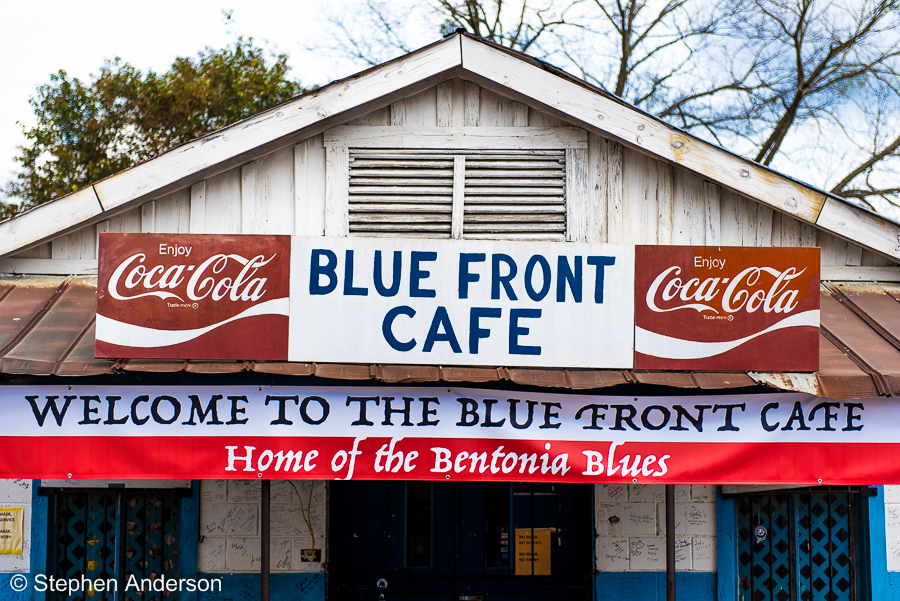
By Brenda Germany
Photos by Stephen Anderson
Page Design by Johnny Cole
“The Bentonia style is one of the most haunting sounds in all of blues. Its blend of minor-key tuning and bleak, forlorn lyrics create a music that manages to be both enthralling and heartbreaking at the same time.”
– Jeff Konkel (Broke and Hungry Records, St. Louis)
It is clear that crossroads have played a recurring role throughout the story of the blues. In this exploration of the Mississippi Blues Trail we’ll discover one more set of crossroads that led to a type of blues distinctly different than any other – Bentonia Blues. Originally known as Pritchett’s Crossroads, the point at which MS Hwy 433 and Hwy 49 meet, Bentonia began as a postal town along the Illinois Central Railway. Lying 15 miles south of Yazoo City, this small rural town of less than 500 residents has influenced music far beyond its borders for more than a century.
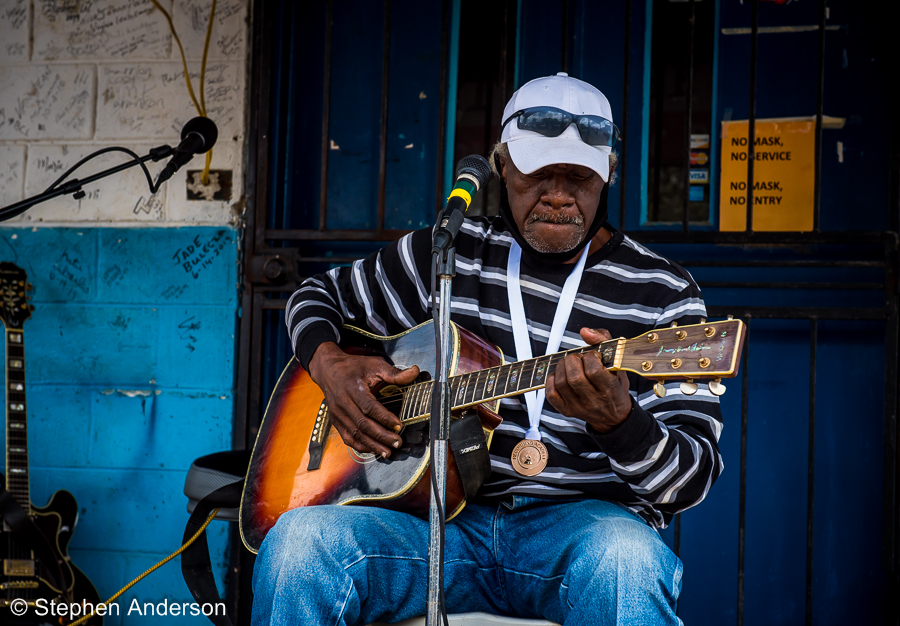 Top Photo: The legendary Blue Front Cafe in Bentonia, MS; above photo: Jimmy “Duck” Holmes at the Blue Front Cafe in Bentonia, MS
Top Photo: The legendary Blue Front Cafe in Bentonia, MS; above photo: Jimmy “Duck” Holmes at the Blue Front Cafe in Bentonia, MS
Upon returning to Bentonia from WWI, Henry Stuckey (1897-1966) began tuning his guitar in the style of a group of Black soldiers from the Caribbean he had met while serving with the U.S. Army. Most blues songs, in contrast to the name, are set to bright, cheerful tones of major-key chords. However, this new tuning style was based on dramatic open D or E minor chords creating a haunting, tense, dark tone with repeating patterns. Its “crossover” or as Skip James referred to it, “crossnote” tuning enabled crossing over major and minor tones. Many music scholars refer to Stuckey as the father of Bentonia Blues.
Blues legend Nehemiah “Skip” James, one of the town’s most celebrated residents, adopted Stuckey’s style of playing which became known as Bentonia School. James became the most well-known of the small group of musicians that also included Jack Owens and Jimmy “Duck” Holmes who mastered the unique tonal qualities associated with the Bentonia School. Holmes (b. July 28, 1947) still carries on the legacy of the Bentonia Blues at the Blue Front Café in Bentonia.
“If they was singing about something good or bad, the more they sing about it, the better they feel about it. And they’ll keep repeating the same thing over and over, because they rejoicing: ‘I’m so glad, so glad, my baby’s comin’ home; so glad, so glad, I don’t have to be alone.” – Jimmy “Duck” Holmes
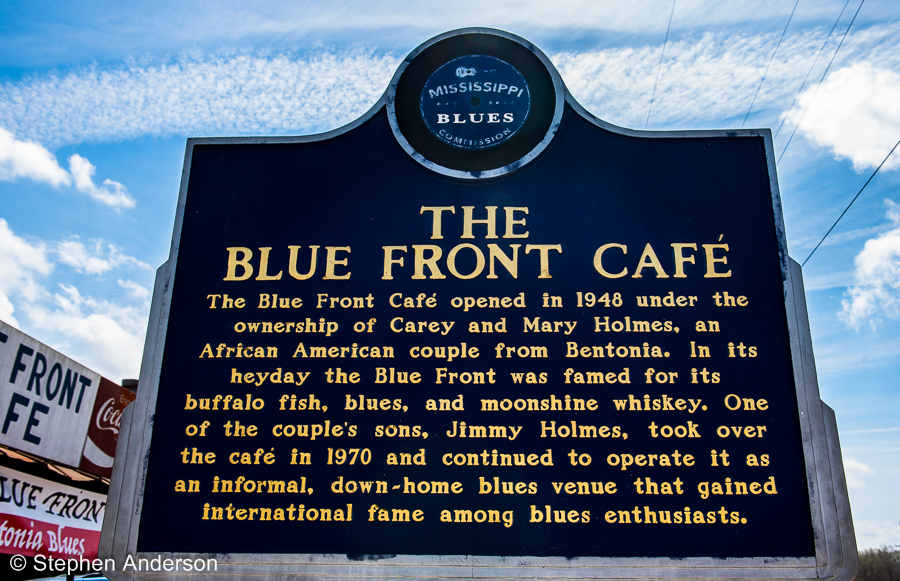 Mississippi Blues Trail Marker honoring the legendary Blue Front Cafe in Bentonia, MS
Mississippi Blues Trail Marker honoring the legendary Blue Front Cafe in Bentonia, MS
Bentonia is home to three Mississippi Blues Trail Markers:
● Blue Front Café (Located at 107 W Railroad Ave in Bentonia, MS)
Jimmy “Duck” Holmes’ parents, Carey and Mary Holmes, opened the Blue Front Cafe in 1948 to serve hot meals to the townspeople who labored at the cotton gin next door or on the surrounding farms. The cafe also offered groceries, drinks, recreation, entertainment, and even haircuts. Although the Blue Front was subject to a 10 p.m. town curfew, at the height of cotton gathering and ginning season the cafe might stay open 24 hours a day to serve shifts of workers around the clock. Music at the Blue Front was often impromptu and unannounced. Many itinerant harmonica players and guitarists drifted through to play a few tunes, but also included such notables as Skip James, Jack Owens, Henry Stuckey, Sonny Boy Williamson No. 2 (Rice Miller), and James “Son” Thomas. When Holmes’ father died, in 1970, he took over the operation of the Blue Front, and continued to organize performances of local musicians. The Blue Front has become a favored destination for blues fans around the world and is reputed to be the oldest operating juke joint in Mississippi.
In 1972, Holmes and his mother founded the Bentonia Blues Festival which is hosted by the historic Blue Front Cafe and held annually the week of the 3rd Saturday in June with the final day-long event held at the Holmes Farm about a mile North of Bentonia. For 49 incredible years, the Bentonia Blues Festival has brought thousands of fans to Bentonia, celebrating and deepening appreciation for its unique version of the blues.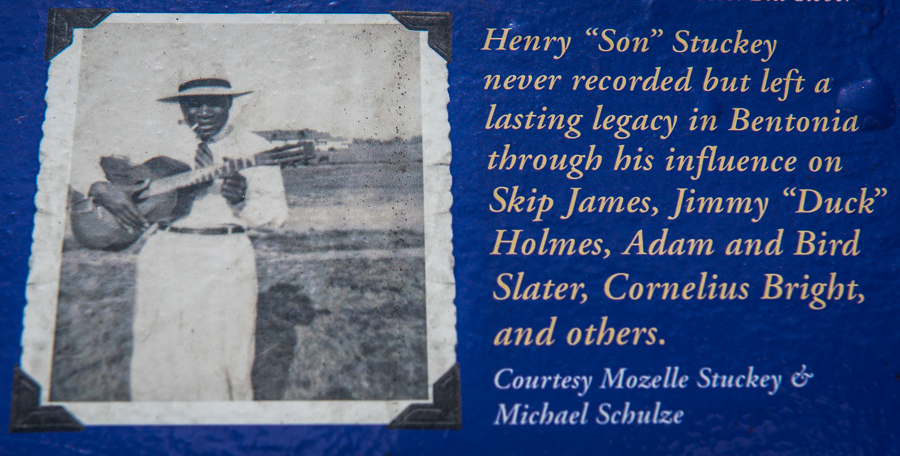 Taken from the Mississippi Blues Trail Marker; courtesy of Mozelle Stuckey & Michael Schulze
Taken from the Mississippi Blues Trail Marker; courtesy of Mozelle Stuckey & Michael Schulze
Although an accomplished Bentonia Blues musician himself and one of the last remaining bluesmen to see and be influenced by Henry Stuckey, Holmes didn’t begin recording until age 59. The St. Louis-based label Broke and Hungry Records released Holmes’ first two albums Back to Bentonia (2006) and Done Got Tired of Tryin’ (2007) which were followed by six more albums under various labels. In 2019, Dan Auerbach of the Black Keys, brought Holmes to Nashville to record in his studio. The resulting album, Cypress Grove, earned Holmes a 2021 Grammy nomination. (Click Here for our article about Holmes’ Grammy nomination)
● Nehemiah “Skip” James (Marker located at Highway 49 South & Highway 433 in Bentonia, MS)
Born in Yazoo City, Mississippi, Skip James (1902-1969) was raised on the Woodbine Plantation, a mile and a half from nearby Bentonia, where he learned to play both guitar and piano. His mother bought his first guitar for $2.50 in 1912. James’ trademark sound came from his E-minor tuning, which he called “cross-note tuning” which he learned from Henry Stuckey, a guitarist five years older who lived on nearby Satartia Plantation. The haunting quality of Nehemiah “Skip” James’ music earned him a reputation as one of the great early Mississippi bluesmen.
In February 1931, he waxed eighteen sides at Paramount’s Grafton, Wisconsin studio that were later issued. James established himself in the field of blues musicians with songs such as “I’m So Glad,” “Devil Got My Woman,” “Special Rider Blues,” and “20-20 Blues.” Paramount Records talent scout H.C. Speir attempted to persuade James to record again in late 1931. But, James refused the offer as he had “gotten religion” after reuniting with his father who had reformed his habits and become a Baptist minister.
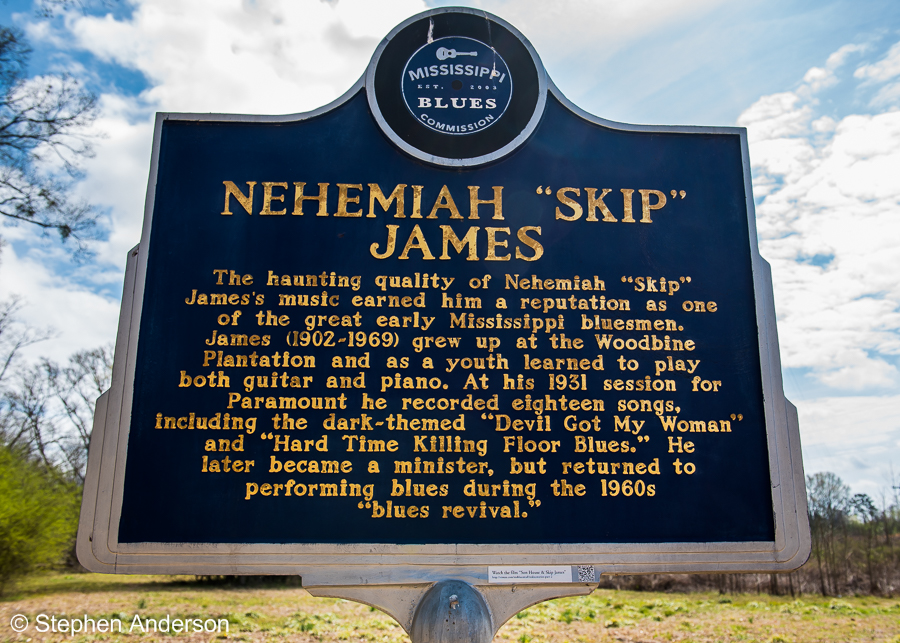 Mississippi Blues Trail marker honoring Nehemiah “Skip” James
Mississippi Blues Trail marker honoring Nehemiah “Skip” James
Skip returned to Bentonia in 1948 and sometimes played for locals at the newly opened Blue Front Cafe, although he did not earn his living as a musician. James was rediscovered by blues enthusiasts in 1964 and together with Son House and Mississippi John Hurt returned to performing during the blues revival of the day. He recorded several albums and gained renewed acclaim from the rock group Cream’s 1966 cover of his song “I’m So Glad,” but the somber quality of much of his music and his insistence on artistic integrity over entertainment value limited his popular appeal. He was inducted into the Blues Hall of Fame in 1992 and in 2020, James’ song “Devil Got My Woman” was added to the Grammy Hall of Fame.
● Jack Owens (Marker located at Highway 433 at Rose Hill Road in Bentonia, MS)
Born L. F. Nelson (1904-1997), he was raised by the Owens family with his maternal grandfather. While very young, Owens learned chords on the guitar from his father and an uncle. He also learned to play the fife, fiddle, and piano while still a child, but his chosen instrument was the guitar. He was another Bentonia bluesman who had also learned from Stuckey.
Jack Owens was thought of as a somewhat country version of Skip James and sang roughly in his usual singing voice and loud enough for people at a party to hear while dancing, utilizing the stomp of his boots for rhythm in the manner of some Mississippi Delta players. Owens, though, experimented with several other tunings, which appear to have been his own. Owens encouraged Holmes to be rigorously honest in his own music and lyrics. “Your lyrics have to be true to what you were singing about, whether it’s hard times, good times, wife done left or you got drunk, it has to be true.”
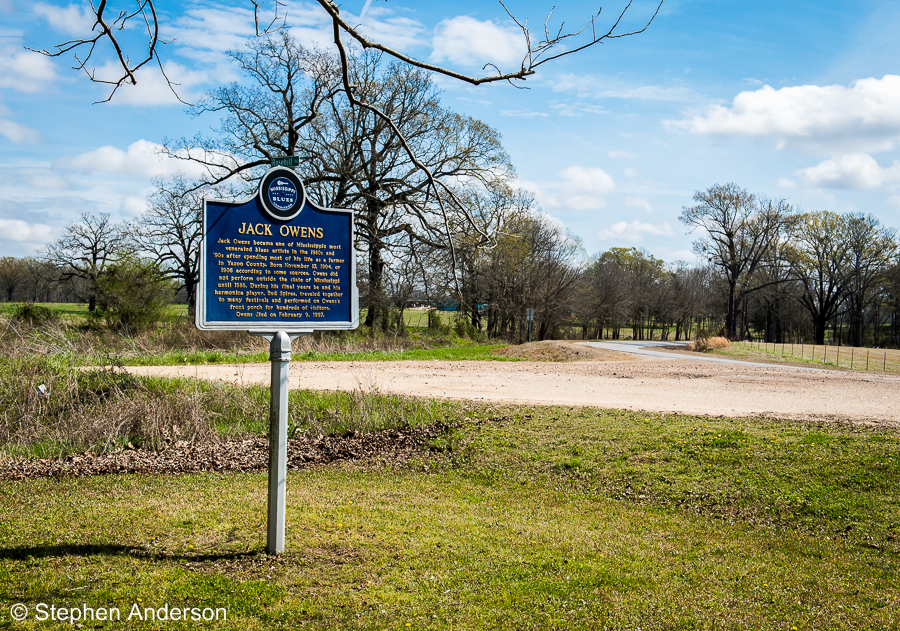 Mississippi Blues Trail marker honoring Jack Owens
Mississippi Blues Trail marker honoring Jack Owens
Although Owens’ music nor his lifestyle in Bentonia changed much over the years, he became one of Mississippi’s most venerated blues artists in the 1980s and ‘90s. He appeared in Alan Lomax’s Land Where the Blues Began and Robert Mugge’s Deep Blues, as well as a commercial for Levi’s 501 jeans. Owens was a recipient of a 1993 National Heritage Fellowship awarded by the National Endowment for the Arts, which is the highest honor in the folk and traditional arts in the United States.
Owens traveled the music festival circuit in the United States and Europe in the last decades of his life, often accompanied on harmonica by his friend, Bud Spires. Owens continued to perform at the Blue Front and at festivals until his death in 1997.
As musicologist David Evans wrote, much of Bentonia Blues was “haunting, brooding lyrics dealing with such themes as loneliness, death and the supernatural . . . Altogether it is one of the eeriest, loneliest and deepest blues sounds ever recorded.”
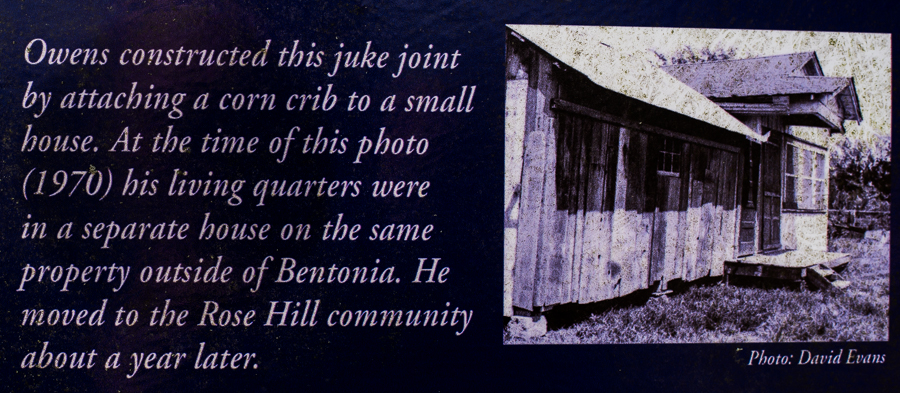 Taken from the Mississippi Blues Trail Marker; courtesy of David Evans
Taken from the Mississippi Blues Trail Marker; courtesy of David Evans
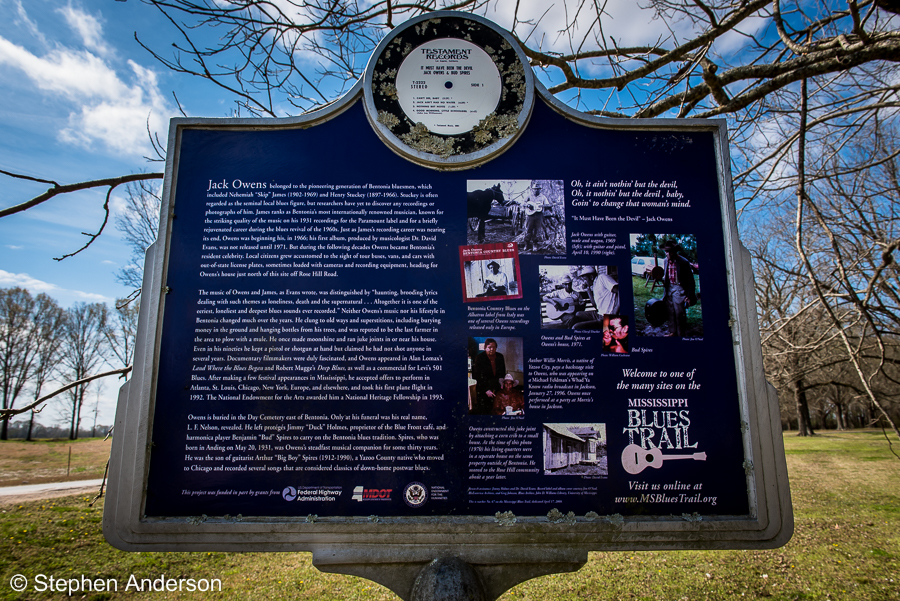
Mississippi Blues Trail marker honoring Jack Owens (side two of marker)
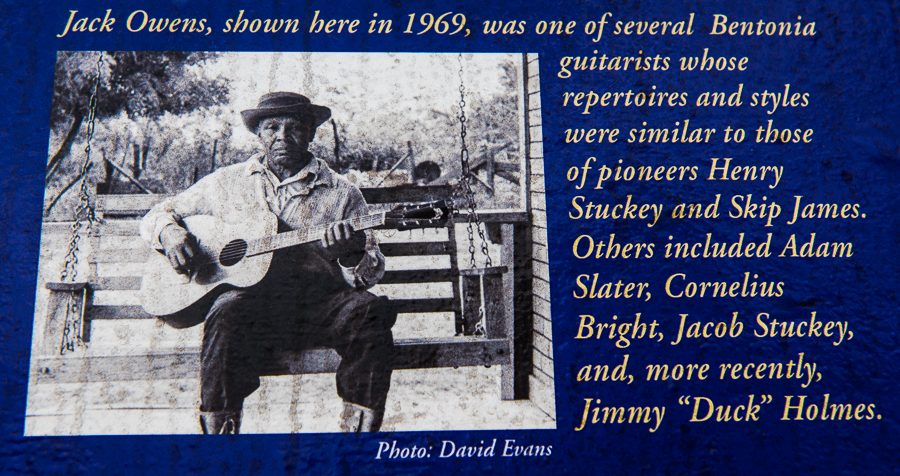
Taken from one of the Mississippi Blues Trail markers honoring Bentonia Blues (courtesy of David Evans)
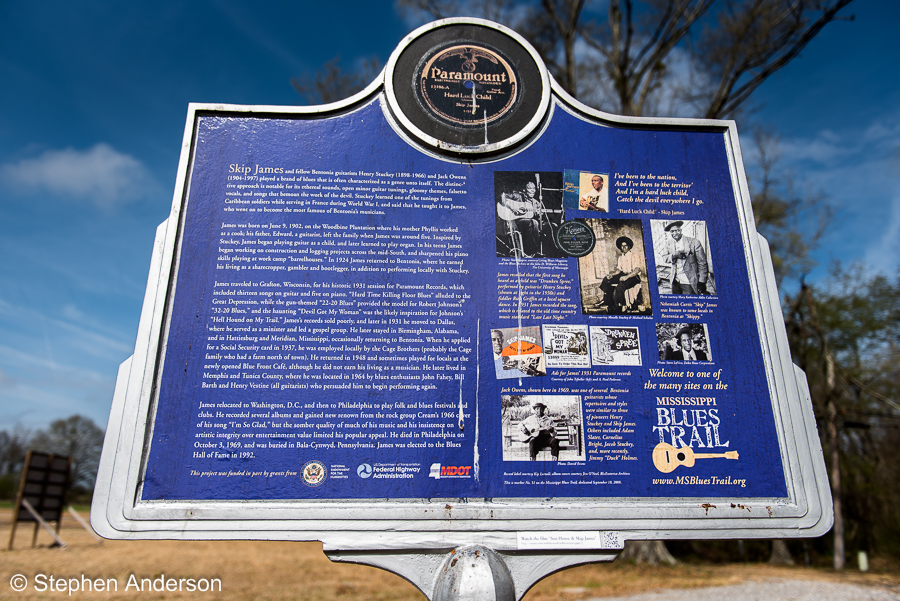
Mississippi Blues Trail marker honoring Skip James (side two of marker)
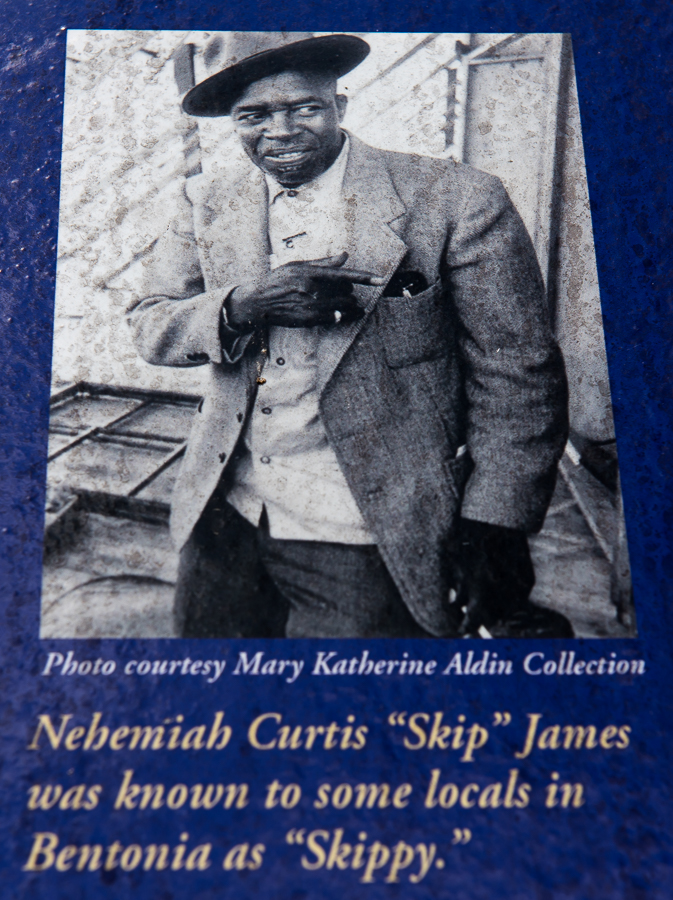 Taken from the Mississippi Blues Trail marker honoring Skip James (courtesy of Mary Katherine Aldin)
Taken from the Mississippi Blues Trail marker honoring Skip James (courtesy of Mary Katherine Aldin)
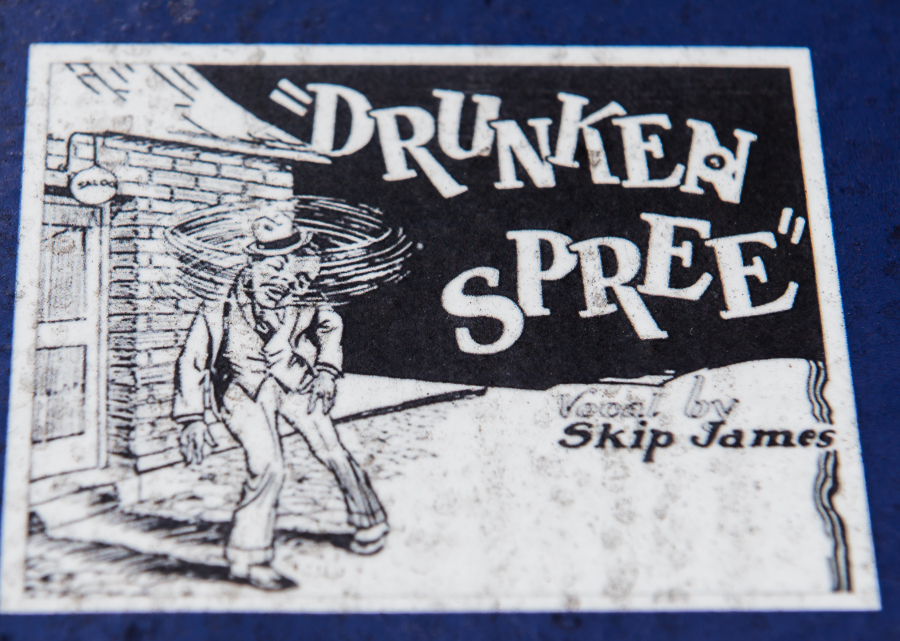 Taken from the Mississippi Blues Trail marker honoring Skip James
Taken from the Mississippi Blues Trail marker honoring Skip James
 Taken from the Mississippi Blues Trail marker honoring Skip James
Taken from the Mississippi Blues Trail marker honoring Skip James
Credits:
● Smithsonian Magazine – Sep. 2021 “At an Old Juke Joint in Mississippi, the Blues Are Alive” by Jim Beaugez
● American Blues Scene – “Skip James and the Haunting Infamous Bentonia Blues” by Matt Marshall – Jun 9, 2021
● www.nps.gov – Nehemiah Curtis Skip James
● Mississippi Blues Commission
Page Designed & Edited by Johnny Cole
© The Southland Music Line. 2022. All rights reserved
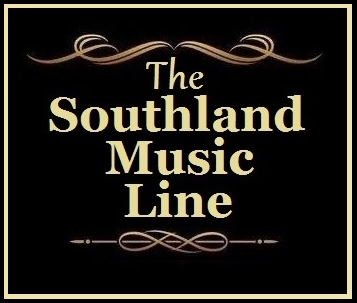
COPYRIGHT NOTICE: We welcome requests for permission to use content from The Southland Music Line website and Facebook page. Any shared articles or photos may not be altered, edited nor cropped and must include the appropriate copyrights of The Southland Music Line.





